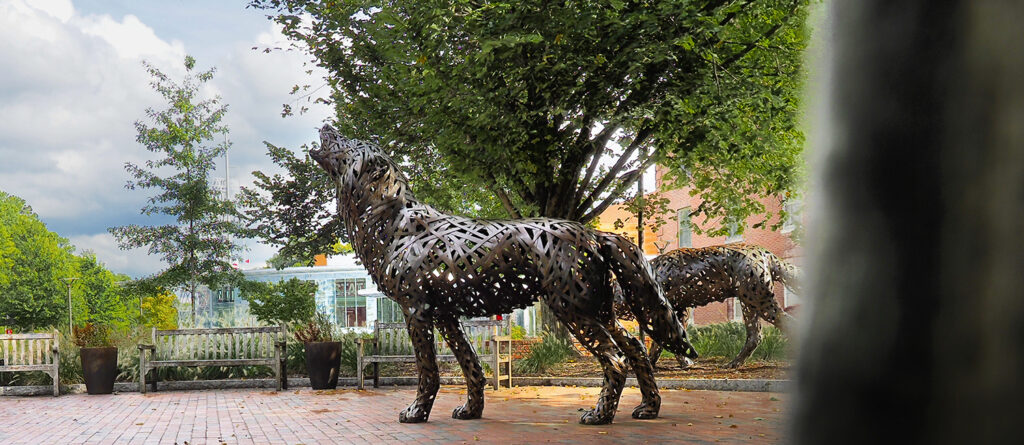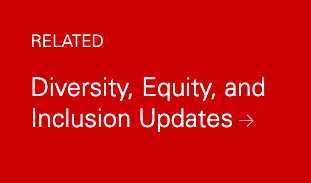
To prepare Park Scholars to make lifelong contributions to the state and world, the Park Scholarships curriculum is continually evaluated and adjusted. This spring marked one of the most significant changes in recent years: the addition of a three-part session designed to introduce students to the impact of racial inequality in the United States.
Groundwater
The program began exploring ways to better incorporate programming focused on racial injustice following the deaths of George Floyd, Breonna Taylor, Ahmaud Arbery, and many others. Existing diversity units within the program’s Leadership Academy primarily focused on an individual’s role and relationship with topics including privilege, identity, and bias. Last summer, with funding from the One Park One Pack: Diversity, Equity, and Inclusion Fund, the program embarked on a process to add programming on systemic racism and its impact to provide students foundational knowledge essential for understanding and addressing racial injustice.
[This] served as an opportunity to examine my own goals and experiences and connect them with some of the key points we learned about racial inequity.Kiran Soma ’24
The Park Scholarships staff and faculty attended the Racial Equity Institute’s (REI) two-day Phase I training in August and, in October, a cohort of 14 volunteers including students, staff, faculty, alumni, Park Advisory Committee members, and a Selection Committee leader attended the REI’s three-hour Groundwater Presentation. Both workshops use data to demonstrate how racism affects institutions and outcomes throughout the country.
Upon receiving feedback from the pilot group, the Park Scholarships staff designed a way to bring the workshop to the freshman class while adding components that emphasized personal and collective reflection: an individual journaling activity and a group discussion. Once a date was set in April for REI’s Groundwater Presentation, members of the Park community including Park alumni and Selection Committee members were invited to participate alongside the students.
Ultimately, the Park Scholarships Class of 2024 was joined by 22 Park community members including current students in other classes, Park alumni, Selection Committee members, Park Advisory Committee members, Park Faculty Scholars, and Park Faculty mentors. The group met over Zoom for the workshop and group discussion, while the journal reflection activity took place in between the two online components.
Seeing It All Together
Nicholas Oyarzun ’24 summarized his takeaway from the workshop: “Regardless of socioeconomic status or background, Black people in our country face issues from conception to the grave that are statistically evident across our nation.”
“While I’d seen a good bit of the data presented before, seeing it all together hammered home how important these structural forces are for shaping our lives, in ways that many of us may not think about,” said Mary Elting ’07, a Park alumna, Park Advisory Committee member, and Park Faculty Mentor who teaches in the Department of Physics.
“The workshop provided me with a greater understanding of how the consequences of structural racism insidiously compound each other in the form of inadequate medical care, diminished educational performance, and discounted economic outcomes,” said Autumn Sylvestri ’23.
“Paired with the journaling assignment and discussion group, the Groundwater workshop served as an opportunity to examine my own goals and experiences and connect them with some of the key points we learned about racial inequity: it looks the same across systems, it is embedded within systems, and external factors (like socioeconomic status) fail to explain differences,” explained Kiran Soma ’24.
It is in the best interest of everyone to work towards dismantling these systems.
Nicholas Oyarzun ’24
Several students expressed being surprised by the jarring statistics shared by REI about ingrained inequities.
Bryan Wilson ’24 remarked that he was “shocked at how early African American children are tracked as ‘troublemakers’ in pre-K schools. To have racial inequity and bias be so potent in the early developmental years of a child’s life only serves to maintain a long-lasting crippling effect on the progress of future generations toward a more equitable society.”
“What shook me to my core were the studies conducted to measure the atrocities Black people face, from neonatal birth rates to pre-school suspensions, to the ability to receive a loan, all of which compound into a timeline of oppression,” added Oyarzun.
We Can Be Proponents of Change
Students explained that participating in these sessions helped them reflect on their areas of interest and how they can make a difference.
“One cause that I am passionate about is education: every child should have equal access to education. Participating in the Groundwater workshop gave me insight into what problems exist within the educational system, where I should focus my efforts, and how I should approach those issues,” Soma said. “Taking the time to see how we can be proponents of change through our professional and service activities provided some clarity about uprooting systemic racism.”
“It has contributed to my interest in approaching racial inequalities from multiple angles such as higher education and health care access, and discussing ways my peers can use their interests to tackle inequalities,” Oyarzun said.
Elting shared that connections and opportunities for further growth and learning were sparked by the workshop. “Inclusion is something I think about a lot in my classroom, but feel like I’m still learning skills to effectively shape it. I met some faculty members at the workshop who informed me about some resources they’ve used to help with that growth. I’m excited to follow up with them over the summer and enact some of their ideas in my course in the fall.”
Be open to a candid perspective on the deep-rooted racial bias America is wrestling with.
Bryan Wilson ’24
In addition to the workshop, the added personal and group reflection sections proved useful for participants. “Incorporating engaging activities and discussions holds us accountable for active personal reflection,” Wilson explained.
“The journaling exercise and discussion group were a helpful first step for thinking about what those data mean for our lives and our work as scholars and in service to others. They helped give me a framework to continue thinking about the ways my privilege has shaped my life so far, and to think about how I can most effectively contribute to reshaping those structures to achieve greater equity,” Elting said.
Be Open
Respondents strongly encouraged anyone with the ability to attend this workshop.
“REI’s Groundwater approach allowed me to reflect and further build upon my understanding of racial inequity within our country,” Oyarzun said. “It is in the best interest of everyone to work towards dismantling these systems.”
“By attending the Groundwater workshop, Park Scholars can expect to apply their previous training on a broader scope and discourse about leadership for radical systemic change within their vocation,” Sylvestri added.
“Participate in the workshop if you have the chance,” Elting encouraged. “The Groundwater workshop isn’t an end goal, but a first step in a longer, deeper — and vital — conversation. Keep listening, reading, and doing your homework after the workshop is over.”
Maintaining an open mind is essential, according to the students.
“Be open to a candid perspective on the deep-rooted racial bias America is wrestling with,” Wilson said. Soma added, “Be open to information that challenges what you think you know and be ready to learn!”
